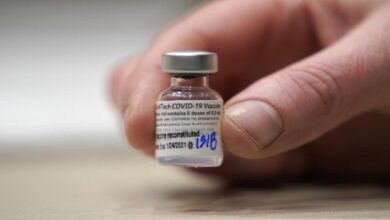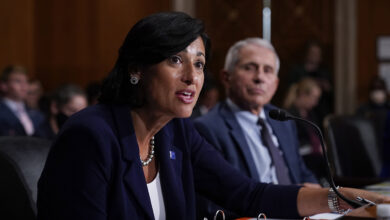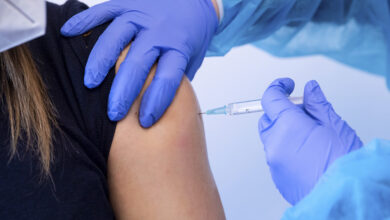Can You Mix COVID-19 Vaccines? Why Experts Say You Can’t Mix and Match Booster Shots

- Mixing and matching COVID-19 vaccines, booster shots, and additional doses have long been discouraged by federal health officials due to a lack of data.
- Only those in a certain demographic who have received an initial Pfizer-BioNTech mRNA vaccine series are currently considered eligible for additional vaccine doses, unless you are considered immunocompromised.
- Those who may meet the screening criteria but did not receive a Pfizer vaccine are being told to wait for further instructions later this fall, pending additional FDA clearance.
- If you choose to seek a third Pfizer vaccine dose now, experts say those who received Moderna’s mRNA vaccine aren’t likely to experience any harm — but that Johnson & Johnson recipients may wish to wait for impeding data.
Federal health officials have fielded many proposals for additional COVID-19 vaccine doses over the last two months. Many Americans were initially under the impression that they would be encouraged to sign up for a third (or second for those who were given a Johnson & Johnson vaccine) dose of their vaccine series around eight months after their last shot — now, however, Food and Drug Administration (FDA) officers have limited additional COVID-19 vaccines to those who received a full Pfizer-BioNTech messenger RNA vaccine.
Those who are considered clinically immunocompromised were cleared to receive additional doses of any COVID-19 vaccine earlier this summer, but additional Pfizer doses are only being offered to individuals who received it as their primary vaccine series and are:
- Currently over the age of 65
- Individuals at high risk for severe COVID-19 infections
- Those over 18 years old who are working in public-facing industries
- Those over 18 years old who are living in high-risk settings, including nursing homes
Officials at the Centers for Disease Control and Prevention (CDC) are well aware that millions of Americans who received other variations of the COVID-19 vaccine also meet those three prerequisites for another shot at this time. Current language on the CDC indicates that third-dose shots will likely be offered for the other two vaccines — Moderna’s mRNA vaccine and Johnson & Johnson’s adenovirus vaccine — on an emergency approval plan here in the U.S.
Research has shown that additional doses of the vaccine may aid immune systems in avoiding contagious COVID-19 variants, primarily the viral Delta variant, especially for those older than 65, per recent data. Vaccines are currently effective in preventing life-threatening cases of COVID-19 that may require hospitalization, but additional doses of the vaccine may address reduced protection against mild cases of the disease.
But what if you currently meet one of these prerequisites now? While current guidelines don’t support Americans seeking an additional vaccine dose from another manufacturer, it’s not unprecedented — in Europe, scientists concluded that mixing a dose of the Pfizer vaccine with another AstraZeneca-Oxford shot led to improved immune response, per the New York Times. Could that mean that getting a different brand of vaccine here in the U.S. is possible for those who could use an immunity boost now?
Is it safe to mix and match COVID-19 booster vaccines?
It’s a tricky question to answer, as there is extremely limited data available to health officials on individuals who have inadvertently signed up for two different brands of COVID-19 vaccines. To be clear, current recommendations suggest that healthcare providers cannot mix and match vaccines, a stance that was formed by FDA and CDC officials as well as the manufacturers themselves, explains Katie Passaretti, M.D., an epidemiologist and medical director of infection prevention for Altrium Health.
Dr. Passaretti clarifies that there are some Americans who have indeed received different vaccine products — usually, it’s due to an adverse allergic reaction to an mRNA vaccine, or based on supply issues in certain areas where there are issues with access to a wide array of vaccines.
This content is imported from Twitter. You may be able to find the same content in another format, or you may be able to find more information, at their web site.
While it hasn’t been authorized yet, officials at Johnson & Johnson have reported that their teams are working on a booster dose. However, if you have only just received your first shot of a two-dose mRNA series, current CDC recommendations advise that you should delay your second dose rather than get another dose from a different brand altogether. Experts like Dr. Passaretti have indicated that there haven’t been adverse effects reported from people mixing vaccines, albeit the data pool being limited at this time.
Should I ask my doctor about a third dose now?
If you’re eligible for an additional Pfizer dose, signing up for another shot can help maintain improved immunity through the upcoming winter flu season. If you’re eligible based on your demographics, medical background or occupation, discussing the timing of a third dose of the COVID-19 vaccine now is crucial, as your healthcare provider may give you special directions outside of current federal guidelines.
NPR reports that a subset of experts in the medical industry are calling for CDC officials to streamline COVID-19 vaccine booster initiatives for Johnson & Johnson recipients sooner rather than later. The reasoning behind this hinges on CDC-provided data indicating that Jonhson & Johnson vaccines provide stagnant protection against severe COVID-19 disease in all age groups, and immunity rates remain lower compared to Pfizer and Moderna recipients. Infectious disease physicians at the University of California San Francisco health system told NPR they have been administering Pfizer booster shots to Johnson & Johnson vaccinated individuals for more than two months despite guidelines.
Mixing and matching vaccines may become more common, or even standard, in the future. Anthony Fauci, M.D., chief White House medical advisor, has confirmed that the National Institutes of Health have nearly concluded trials with participants who mix vaccine doses from different manufacturers. These medical experts first tested what would happen when Moderna recipients received another brand of vaccine for their booster dose — Dr. Fauci told reporters that results concerning mixed Johnson & Johnson vaccines may be ready within a week as well.
This content is imported from Twitter. You may be able to find the same content in another format, or you may be able to find more information, at their web site.
Pfizer’s results for the same trial are expected to be available later this month, but the medical community at large believes that FDA officials will be reviewing Moderna data to potentially authorize additional doses before considering mixing and matching.
“As with all things we do, they must be submitted to the FDA for their regulatory approval,” Dr. Fauci said when asked more about mixing and matching vaccines. “So you don’t want to get ahead of the FDA, but at least that’s where the data are right now.”
This content is created and maintained by a third party, and imported onto this page to help users provide their email addresses. You may be able to find more information about this and similar content at piano.io
Source link




